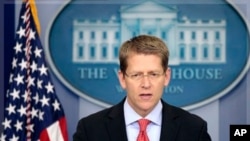The White House faced additional questions Thursday on U.S. and NATO discussions about potentially ending combat operations in Afghanistan by the middle of next year as foreign forces transition to an Afghan security lead.
Several times during the news briefing, reporters asked Press Secretary Jay Carney whether there has been any fundamental change in the U.S. and NATO timeline set at a NATO summit in 2010.
NATO vowed to complete the transfer of security responsibilities to Afghan forces and withdraw foreign troops by the end of 2014. But officials have always stressed that security conditions would determine the pace and scope of the process.
What Carney made clear in responding to a number of pointed questions is that the 2014 target date has not changed, and that Defense Secretary Leon Panetta, in remarks on Wednesday, was not announcing any new decision.
In his remarks to reporters accompanying him to Brussels, Panetta said the U.S. would like to complete a transition from a combat role to a training, advise and assist role "hopefully" by "mid- to the latter part of 2013."
Carney sought to keep the focus on President Obama's main objective -- disrupting, dismantling and ultimately defeating al-Qaida. He responded this way when asked to clarify how long U.S. troops could be playing a combat role.
"Well potentially, until that time when full security lead, is actually the phrase that we use here, until that transfer takes place, which as designated by NATO in Lisbon will be accomplished by the end of 2014," Carney said.
President Obama's spokesman was asked if the transfer of security responsibilities precluded combat participation by U.S. forces. No, he said, and drew a link to Iraq, where the U.S. handed over to Iraqi forces but still had highly-capable forces in country that could assist in combat missions.
On how quickly U.S. forces would be withdrawing after September, when U.S. troop levels are expected to be about 68,000, Carney said that remains to be determined by NATO after assessing how successful the transition to an Afghan security lead has been.
After Secretary Panetta's remarks on Wednesday, Republican presidential candidate Mitt Romney continued his sharp criticism of Mr. Obama, focusing on the Panetta remarks.
"The Taliban hears it, the Pakistanis hear it, the Afghan leaders hear it. Why in the world do you go to the people that you’re fighting with and tell them the day that you’re pulling out your troops? It makes absolutely no sense. His naivete is putting in jeopardy the mission of the United States of America and our commitments to freedom," Romney said.
Asked about this, Jay Carney said he would not address specific criticisms, but then said some critics of the president's strategy supported an Afghanistan policy under the George W. Bush administration that lacked clarity.
President Obama, he said, has a very clear, focused, achievable policy, adding Mr. Obama does not support "war without end."
White House Struggles to Clarify Obama Afghanistan Strategy
- By Dan Robinson





